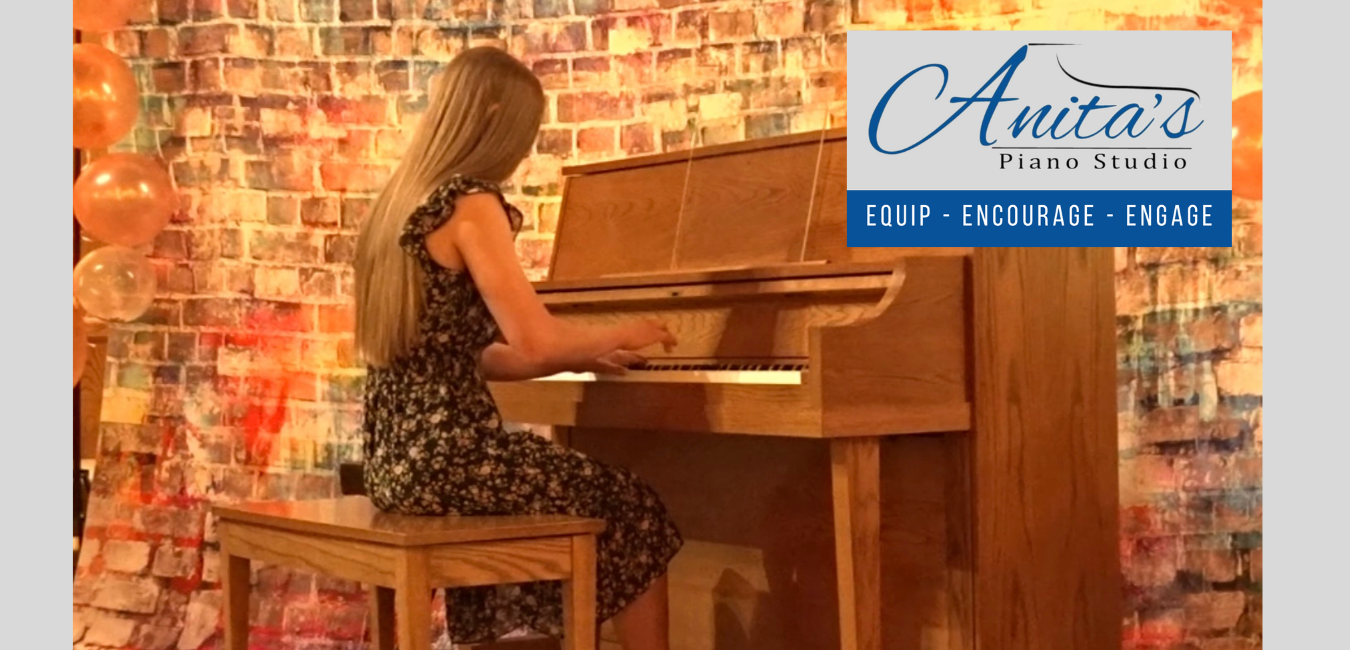Caring For Your Piano in the Winter
Tuesday, November 30, 2021 by Anita Byers | Your Home Piano
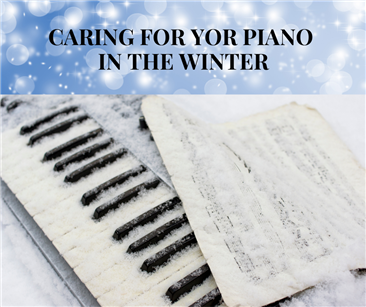
The temperature is getting colder outside and our heat has been turned on. How does this affect our acoustic pianos? In our area, the relative humidity is very low during the cold winter season, and very high during the spring and summer.
Keeping the humidity level around your piano as constant as possible will help it to stay in tune longer and help keep your piano from humidity change damage.
Here are steps to take to protect your piano this winter.
MAINTAIN THE HUMIDITY IN THE ROOM.
The best humidity level for a piano is between 40-50% relative humidity. Levels below 35% will excessively dry out the wooden parts of the piano and levels over 50% will cause rust and corrosion damage to the metal parts of the piano.
If you do not know the humidity level around your piano, I suggest you purchase a hygrometer. This inexpensive little gadget sits right next to my piano so I can keep a close eye on the relative humidity. I shoot for 45% in my piano room in the winter which is achieved by a room humidifier—it is good for your nasal passages and skin – it's also good for your piano.
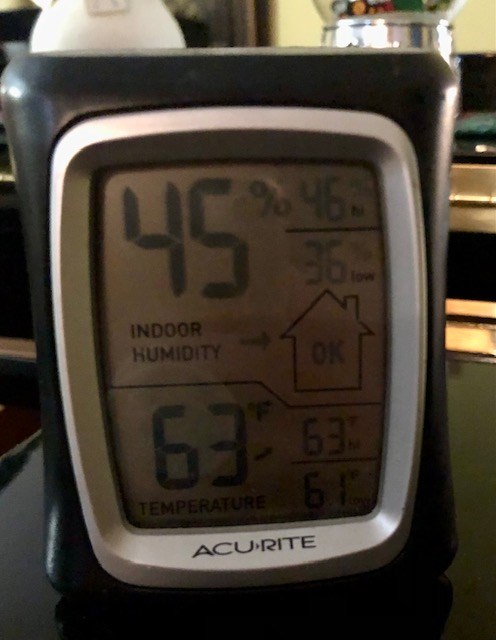
In addition you could have a Dampp-Chaser humidity control system installed on your piano. It includes a dehumidifier and a humidifier system. I have this system on my piano and also use a room humidifier in the winter as recommended by my piano technician.
PLACE YOUR PIANO IN THE PROPER LOCATION.
Make sure to keep your piano away from areas that are too hot or too cold. Avoid placing your piano near opened doors/windows or near a heating source or vent. Also never allow direct sunlight to touch your instrument. It can damage the interior and ruin your piano’s finish.
An ideal temperature is around 68-70 degrees Fahrenheit. Like humidity, keeping as constant a temperature as possible is key.
TUNE YOUR PIANO.
Timing your tuning around the change of seasons can help your piano maintain a more consistent sound and tuning stability through the winter season.
These three steps will help your piano sound beautiful all year long--especially in the winter!
What Parents Need to Know About Piano Practice
Tuesday, September 28, 2021 by Anita Byers | Practice
Piano is different than any other after-school activity. With piano, practice is done at home during the week and what happens each week with the teacher is the instruction. Practice is so important in making progress. The more progress a student makes, the more fun piano is! There are 168 hours in a week, but I only spend 30-45 minutes of that time with your pianist.
A parent's role in home practice is crucial. There are many ways you can help your pianist at home and ensure that the progress keeps happening on a weekly basis. Today, I am going to share bits of an article written by Andrea Dow, Teach Piano Today blogger and the co-author of the WunderKeys piano method. I hope the ideas shared in this article help take the mystery out of piano practice and give you ideas of how to help your pianist at home.
.png)
WHAT PARENTS NEED TO KNOW ABOUT PIANO PRACTICE
1. Your children will need help – Up until about age 11, children need hands-on help with home practice. And even though you yourself may not read music or play the piano, your assistance is still very much needed! Parental help can take the form of reading lesson notes, organizing practice time wisely, providing encouragement through difficult sections or situations, and seeking out answers for “I’m stuck on this” problems. Asking a young child to be in charge of something as important as piano practice is often asking too much. Your help at home will make a substantial difference in your children’s progress.
2. Your children need you to establish a routine – Piano practice that happens every single day is by far the most effective practice structure. 30 minutes three times a week is just 90 minutes. 20 minutes seven days a week is 140 minutes. The total difference is 43 hours of missed practice per year if your children are only at the piano three times a week!
Short, focused and regular visits to the piano help your children retain and understand what they are learning while making the most of generally short attention spans. If practice is enjoyable, rather than arduous, your children will naturally (and unknowingly!) increase the time they spend on the bench… eventually reaching that 30 minute mark.
Setting a regular time of day when piano practice happens “no matter what” will ensure a daily practice routine is easy for your children to maintain.
3. Your children need lots of encouragement – Learning to read music and play the piano can be difficult; it can be discouraging… it can feel overwhelming. Your children (no matter what their age) need loads of encouragement.
And not just verbal encouragement. You can show your children that you value their efforts by attending their recitals with enthusiasm, inviting friends and family to listen to them play, and taking the time to sit and listen to them practice with your undivided attention.
4. Your children need a home instrument that is enjoyable to play – Much of the pleasure from playing the piano comes from one’s ability to emote feeling, nuance and expression through music. Even young beginners will experience great satisfaction from making beautiful sounds…. so choose an instrument that gives them the best opportunity to make beautiful sounds. Guidance from your children’s teacher will help you find an affordable piano (don’t worry, there are many great and affordable options) that will give your children the tool they need to truly experience piano lessons. An investment in a good instrument protects the investment you are making in your children’s musical education.
5. Your children need a positive practice environment – Aside from providing encouragement, your children need you to create a positive practice atmosphere. Help your children avoid “cramming” the day before lessons. Stick to your daily routine to avoid weeks of forgotten practice (which lead to feelings of inadequacy on the part of your children). Music is joyful… and so practicing music should be as well. This is, fortunately, something that you are able to create easily with a commitment to regular practice.
6. Your children need you to communicate with their teacher – Working as a parent/child/teacher triangle is the optimal way to ensure progress and success in piano lessons. Be sure to communicate often with your children’s piano teacher. Check in on how lessons are progressing, ask for help if something is difficult for your children at home, let your teacher know when practice weeks have gone extremely well (or not so well). Working as a team means your children are supported equally on all sides at all times.
7. THE PLEASURE OF BEING A PIANO PARENT…
Learning to play music is a life-changing experience. And, as a parent, the process is a thrill to watch. Being a major part of this accomplishment is incredibly rewarding! The profound pleasure of being a “piano parent” far outweighs the required extra efforts; and this is, by far, the most important thing that piano teachers want parents to know about piano practice.
THIS YEAR'S PRACTICE CHALLENGE
Tuesday, August 24, 2021 by Anita Byers | Practice Challenge
I am challenging each of my students to learn 30 new pieces this school year.
Here is how it works: Pieces will need to be at least 16 measures (8 for beginning students) and at a variety of levels. Students should be learning pieces of three different level varieties:
1. Challenging
2. At their level
3. Easier, fun to learn pieces
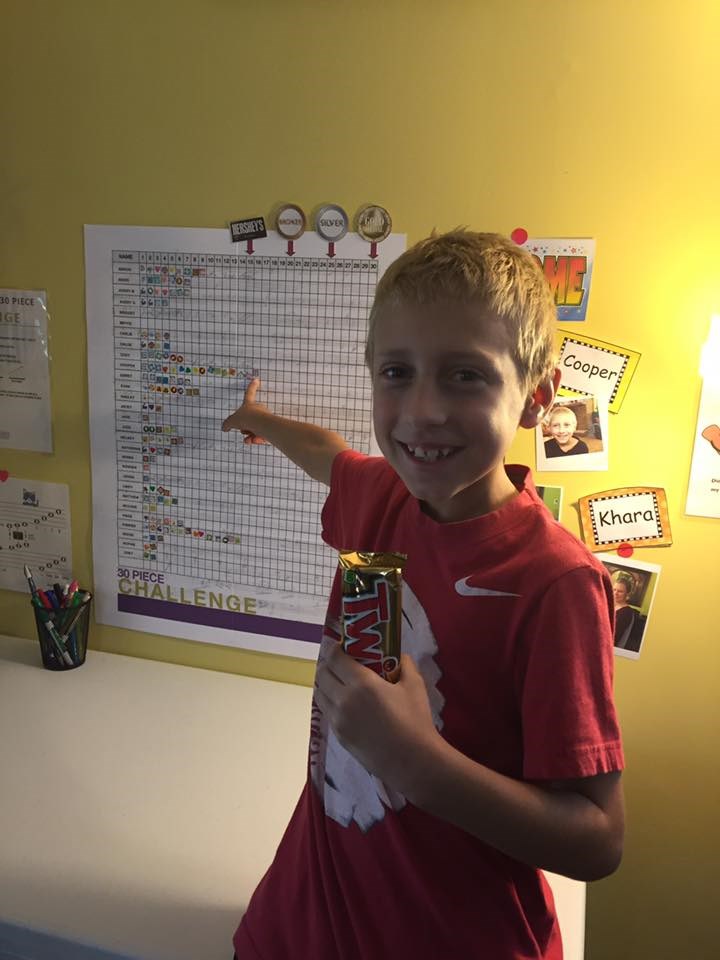
It has been a few years ago since we've done this - Cooper is much taller these days!
Each student will have a form in their notebook to keep track of learned pieces and a studio-wide poster will be on the wall for all to see the progress. In order to be added as learned, pieces must have correct notes, rhythm, articulation, dynamics and tempo. As each piece is marked completed, I will record a video of the student playing their piece (or a student may submit a video through Tonara that was recorded at home). At the end of the year, each student will receive a link to their videos. Students completing the challenge will be recognized at the spring recital.
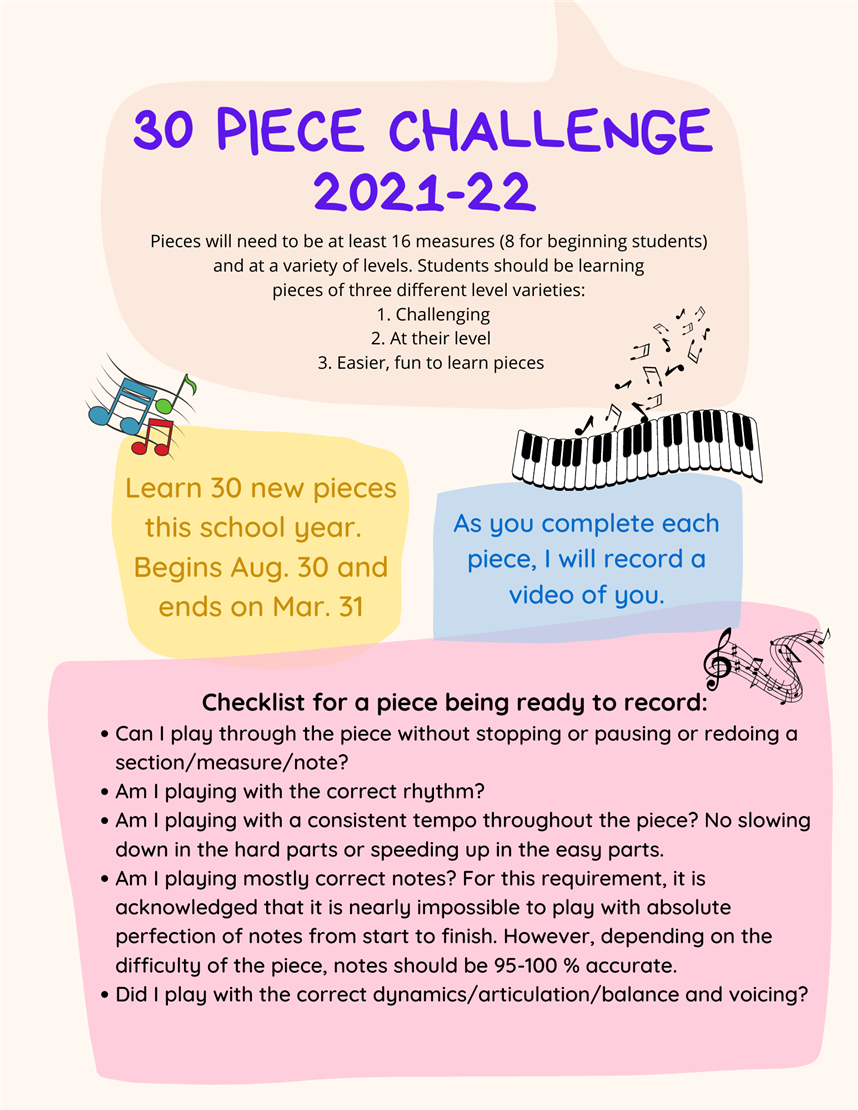
The benefits to this challenge are: increased motivation, improved sightreading and to build confidence—the more music a student can play, the more confident and proficient they feel.
We will begin the challenge on August 30 and end on March 31.
